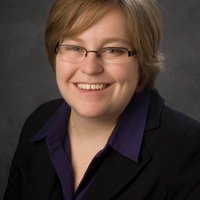Undergraduate Philosophy Conference: Student Presentations, Keynote Alison Reiheld
March 23, 2018

The Philosophy Department in Webster University's College of Arts and Sciences invites the community to the 13th Annual Undergraduate Philosophy Conference on Friday, March 30, in the University Center Sunnen Lounge.
Organized by Webster students and the Philosophy Department, this year’s conference features engaging student presentations on topics of contemporary interest, as well as a timely keynote presentation by Alison Reiheld, assistant professor of philosophy at Southern Illinois University Edwardsville.
Reiheld's keynote, “I Can’t Hear You When You’re Angry: Civility, Righteous Anger and Silencing” takes place at 12 p.m.
Student presentations in the morning and afternoon cover topics such as the death penalty, transracial adoption, corporate social responsibility, bridging nature and technology, and parochialism in foreign aid. See the abstract of Reiheld's keynote and the full schedule of student presentations below, or visit www.WebsterPhilosophyConference.com.
Keynote Abstract
Alison Reiheld, PhD
In a morally diverse society, norms of civility allow us to disagree vehemently with each other and nonetheless work together, be neighbors, be fellow citizens, and generally not set each other on fire. Civility constrains our discourse in productive ways. Traditional ways of interpreting civility mean that we must “keep a civil tongue in our head,” must not “rock the boat,” and must put the continuation of a stable civil society above our own personal concerns and certainly above emotional displays. Norms of civility thus gain normative dominance.
As I have argued elsewhere, while civility is valuable, understanding civility as fundamentally about respect for persons rather than about continuation of a stable civil society leads to Acceptable Exceptions to the norms of civility. We should be allowed to violate the formal norms of civility so long as we are motivated to do so by respect for persons. It is just such a kind of disruption that civil disobedience and street protests seek to produce. We've seen this in our own community, most recently in Ferguson after the killing of Michael Brown and in the St. Louis Metro area after the acquittal of Jason Stockley in the killing of Anthony Lamar Smith.
Yet all too often, such protests are condemned as “uncivil” and the anger of protesters is used to dismiss their speech. This talk examines justified anger in the face of ongoing injustice which violates respect for persons. Such anger and its vehement expression, I argue, are acceptable exceptions to norms of civility. Yet, the very expression of justified anger may itself be silenced, even used as an excuse to silence precisely because it is commonly viewed as a violation of norms of civility.
I consider what constitutes justified anger, why anger is an appropriate response in certain circumstances, and the mechanisms used to silence justified anger. This includes the way that audiences sometimes conflate the speaker’s angry critique of an unjust system with an angry critique of those who benefit from it, thereby allowing themselves to accuse the speaker of an even higher level of incivility: personal attack. Using the norms of civility as a basis for silencing those who express justified anger both happens, and is a gross misuse of civility.
Conference Schedule, 10 a.m.–3:15 p.m.
10 a.m. Student Presentations:
- Alexandra Lubbe, “A Rights-Based Approach for the Global Abolition of the Death Penalty”
- Elizabeth Stanza, “A Virtuous Approach to Transracial Adoption”
11:30 a.m. Lunch
12 p.m. Keynote Presentation
1:30 p.m. Student Presentations:
- Mariah Pugliese, “Bridging the Divide: Modifying and Merging Nature and Technology”
- Michael Hawkins, “Parochialism: Foreign Aid”
- Joy Kuhlo, “Corporations as Entities and Their Corporate Social Responsibility Obligations Through Virtue Ethics and Neo-Kantian Interpretation”
For more information visit www.WebsterPhilosophyConference.com or contact Bruce Umbaugh, professor of philosophy in the Webster University College of Arts and Sciences.
